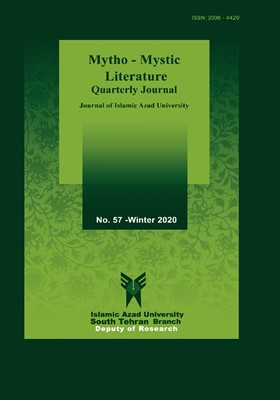The Concept of "the Perfection of Demons and Amesha Spenta" Based on Mazda Religion and Pre-Aryan Myths A Structural Analysis
Subject Areas : MythoHojatollāh Esmāeelniā Ganji 1 * , Rezā Forsati Jooybāri 2 , Hosseinali Pāshāpāsandi 3
1 - Ph. D. in Persian Language and Literature, IAU, Qaemshahr Branch
2 - The Assistant Professor of Language and Literature, IAU, Qaemshahr Branch
3 - The Assistant Professor of Language and Literature, IAU, Qaemshahr Branch
Keywords: The Perfection of Demons, Amesha Spenta, Pre-Aryan, Discursive Disjunction, Dualism in Mazda Religion,
Abstract :
In this paper, by using descriptive-analytical method, the authors try to consider the concept of "the perfection of Demons and Amesha Spenta" in Avestan language. By delving deeply into the vocabulary structure and the comparative concepts, it is attempted to present a new version of the subject. Dualism can be found in all the details and practices of Mazda religion and has a "tree-like" function; as we move from the root to the details, the proliferation in quantity becomes more apparent while the fundamental properties of the root can be pursued in the sub-branches and details. What constitutes the roots of this dualism is the first confrontation of Ahura Mazda with Ahriman in which Ahura Mazda creates the Amesha Spenta and, in retaliation, Ahriman creates Demons. The detailed analysis of the characteristics of each member of these two groups (Amesha Spenta and Demons) reveals the details of the dualism and the hidden angles of the confrontation. The most effective method to achieve this is to examine and compare the traits of them. This method paves the way for other confrontations that exist in the sub-branches of this "tree-like" system and manifest in the form of and Ahuraic Ormazdian and Ahrimanian creatures.
آموزگار، ژاله. 1371. «دیوها در آغاز دیو نبودهاند». مجلة کلک. ش 30. صص24ـ16.
اردکانی، محمدرضا. 1383. اکولوژی. تهران: دانشگاه تهران.
اوستا. 1371. ترجمة جلیل دوستخواه. چ 1. تهران: مروارید.
ایونس، ورونیکا. 1373. اساطیر هند. ترجمة باجلان فرخی. تهران: اساطیر.
بهار، مهرداد. 1381. پژوهشی در اساطیر ایران. تهران: آگاه.
بیرونی، ابوریحان. 1362. التفهیم فی صناعة التنجیم. جلالالدین همایی. تهران: هما.
پورداوود، ابراهیم. 2536. یشتها. ج 1. به کوشش بهرام فرهوشی. تهران: هرمس.
__________. 1380. فرهنگ ایران باستان. تهران: اساطیر.
پیترز، اف، ئی. 1384. یهودیت، مسیحیت و اسلام. ترجمة حسین توفیقی. تهران: مرکز مطالعات و تحقیقات ادیان و مذاهب.
توفیقی، حسین . 1390. آشنایی با ادیان بزرگ. تهران: سمت.
دادگی، فرنبغ. 1368. بندهش هندی. به گزارش رقیه بهزادی. چ 1. تهران: مؤسسه مطالعات و تحقیقات فرهنگی.
ــــــــــــــــ. 1385. بندهش. ترجمة مهرداد بهار. چ 3. تهران: توس.
راشدمحصل، محمدتقی. 1366. گزیدههای زاداسپرم. تهران: مطالعات و تحقیقات فرهنگی.
رضی، هاشم. 1381. گزارش وندیداد. چ 1. تهران: بهجت.
ــــــــــــــــ. 1384. دین و فرهنگ ایرانی پیش از عصر زرتشت. تهران: سخن.
زمرّدی، حمیرا و زهرا نظری. 1390. «ردپای دیو در ادب فارسی». دو فصلنامه علمی و تخصصی علامه. ش 31. صص98ـ55.
فرهوشی، بهرام. 1387. جهان فروری. تهران: کاریان.
ماکیاولی، نیکولو. 1375. شهریار. ترجمة داریوش آشوری. تهران: مرکز.
میرزایناظر، ابراهیم. 1370 . ترجمة روز هرمزد، ماه فروردین، روز خرداد. مشهد: ترانه.
میرفخرایی، مهشید. 1367. ترجمه روایت پهلوی. تهران: مؤسسه مطالعات و تحقیقات فرهنگی.
میلتون، جان. 1382. بهشت گمشده. ترجمة شجاعالدین شفا. چ 3. تهران: نخستین.
نیکوبخت، ناصر، هیبتالله گندمانی و علیرضا محمدی کلهسر. 1389. «فلز و قداست آن در اساطیر ملی و متون دینی». ادبیات عرفانی و اسطورهشناختی دانشگاه آزاد اسلامی واحد تهران جنوب. س6. ش 18. صص126ـ111.
هاج، پاول. 1378. ساختار ستارگان و کهکشانها. ترجمة توفیق حیدرزاده. تهران: کارون.
_||_References
Āmūzgār, žāle. (1992/1371SH). “Dīv-hā dar āqāz dīv nabūde-and”. Kelk. No. 30. Pp. 16-24.
Ardakānī, Mohammad Rezā. (2004/1383SH). Ecology. Tehrān: Tehrān University.
Avestā. (1992/1371SH). Tr. by Jalīl Dūstxāh. 1st ed. Tehrān: Morvārīd.
Bahār, Mehrdād. (2002/1381SH). Pažūheŝī Dar asātīr-e īrān. Tehrān: Āgāh.
Bīrūnī, Abūreyhān . (1983/1362SH). Al-tafhīm fī Sanā'at al-tanjīm. With the Effort of Jalāloddīn Homāyī. Tehrān: Homā.
Dādegī, faranbaq. (2006/1385SH). Bondaheš. Ed. by Mehrdād Bahār. 3rd ed. Tehrān: tūs.
_______________________. (1989/1368SH). Bondaheš-e hendī. Tr. by Roqayye Behzādī. 1st ed. Tehrān: Mo’assese-ye Motāle’āt va Tahqīqāt-e Farhangī.
Farahvašī, Bahrām. (2008/1387SH). Jahān-e Farvarī. Tehrān: Kārīyān.
Hodge, Paul W. (1999/1378SH). Sāxtār-e setāregān va kahkešān-hā (Concepts of contemporary astronomy). Tehrān: Kārūn.
Machiavelli, Niccolò. (1996/1375SH). Šahrīyār (Il Principe). Tr. by Daryūš Āšūrī. Tehrān: Markaz.
Milton, John. (2003/1382SH). Behešt-e gomšode (lost paradise). Tr. by Šojā’oddīn Šafā. 3rd ed. Tehrān: Noxostīn.
Minū-ye Xerad. (2006/1385SH). Tr. by Ahmad Tafazzolī. 4th ed. Tehrān: Tūs.
Mīrfaxrāyī, Mahšīd. (1988/1367SH). Tarjeme-ye revāyat-e Pahlavī. Tehrān: Mo’assese-ye Motāle’āt va Tahqīqāt-e Farhangī.
Mīrzā-ye Nāzer, Ebrāhīm(1991/1370SH). Tarjeme-ye rūz-e hormozd, māh-e farvardīn, rūz-e xordād. Mašhad: Tarāne.
Nīkūbaxt, Nāser and Heybatollāh Akbarī gandomānī and Alī Rezā Mohammadī Kolahsar. (2010/1389SH). “Felez va qedāsat-e ān dar asātīr-e mellī va motūn-e dīnī”. Quarterly Journal of Mytho-Mystic Literature. Islamic Azad University- South Tehrān Branch. Year 6. No. 18. Pp. 111-126.
Peters, F. E. (2005/1384SH). Yahūdīyat, masīhīyat va eslām (Judaism, christianity, and islam: the classical texts and their interpretation). Tr. by Hossein Towfīqī. Tehrān: Markaz-e Motāle’āt va Tahqīqāt-e Adyān va Mazāheb.
Pūrdāvūd, Ebrāhīm. (1977/1356SH). Yašt-hā. 1st Vol. With the Effort of Bahrām farahvašī. Tehrān: Hermes.
_________________________. (2001/1380SH). Farhang-e īrān-e bāstān. Tehrān: Asātīr.
Rāšed Mohassel, Mohammad Taqī. (1987/1366SH). Gozīde-hā-ye zādesparam. Tehrān: Mo’assese-ye Motāle’āt va Tahqīqāt-e Farhangī.
Razī, Hāšem. (2002/1381SH). Gozāreš-e vandīdād. Tehrān: Bahjat.
________________. (2005/1384SH). Dīn va farhang-e īrānī pīš az asr-e zartošt. Tehrān: Soxan.
Towfīqī, Hossein. (2011/1390SH). Āšnāyī bā adyān-e bozorg. Tehrān: Samt.
Veronica, Ions. (1994/1373SH). Asātīr-e hend (Indian mythology). Tr. by Bājelān Farroxī. Tehrān: Asātīr.
Zomorradī, Homeyrā and Zahrā Nazarī. (2011/1390SH). “Radd-e pā-ye dīv dar adab-e fārsī”. Dofasl-nāme-ye Allāme. No. 31. Pp. 55-98.

